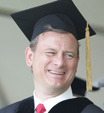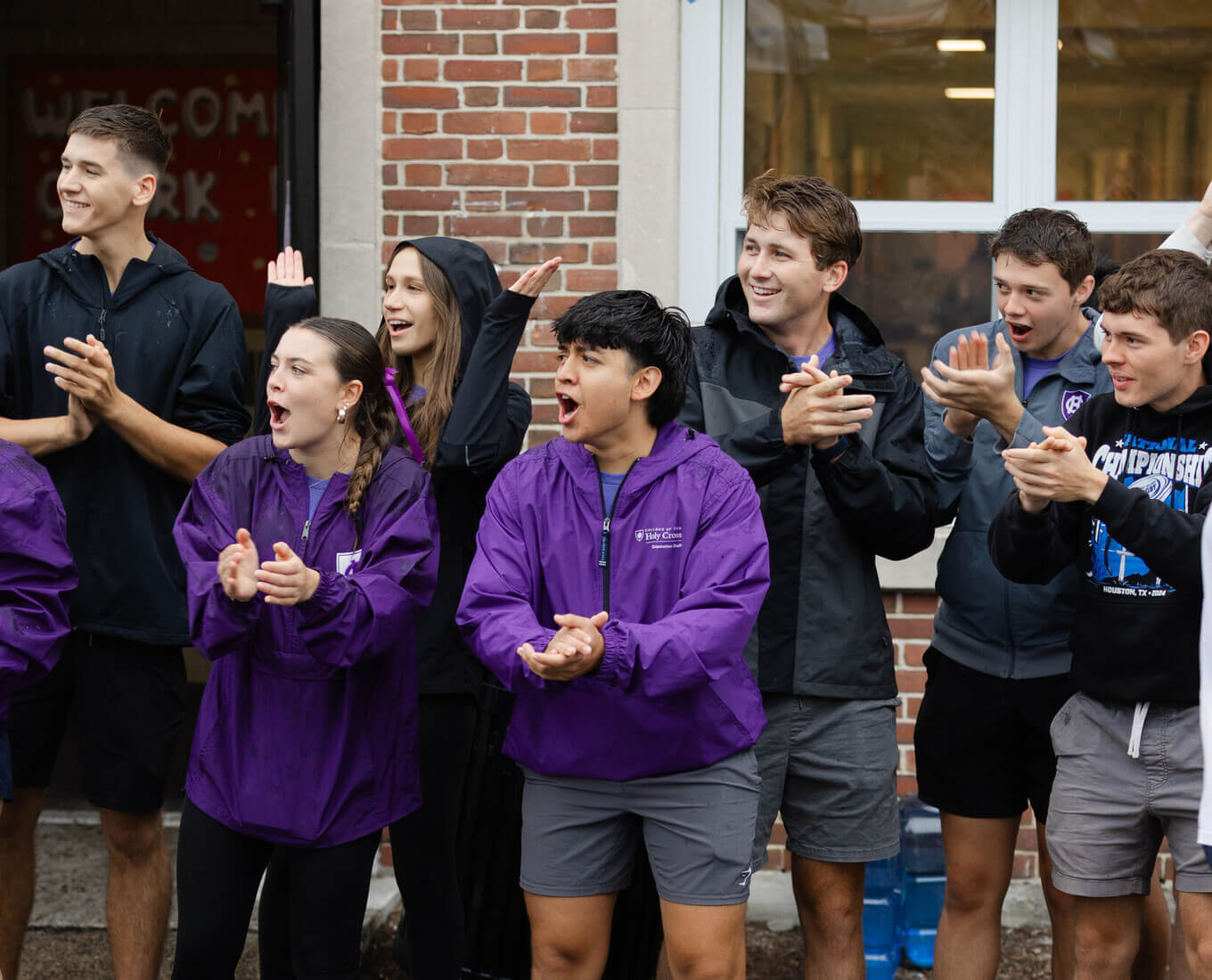 Two members of the Holy Cross Class of 2007 had the opportunity to ask a few questions of their honorary classmate — Commencement speaker and honorary degree recipient John G. Roberts, Jr., Chief Justice of the United States. Kerry Anne Hoffman and Patrick Murray, who served as co-chairs of the College’s 2006-07 Student Government Association, teamed up again to query the Chief Justice about the value of a liberal arts education, his favorite courses as an undergraduate at Harvard, what has surprised him about the Supreme Court, and more.
Two members of the Holy Cross Class of 2007 had the opportunity to ask a few questions of their honorary classmate — Commencement speaker and honorary degree recipient John G. Roberts, Jr., Chief Justice of the United States. Kerry Anne Hoffman and Patrick Murray, who served as co-chairs of the College’s 2006-07 Student Government Association, teamed up again to query the Chief Justice about the value of a liberal arts education, his favorite courses as an undergraduate at Harvard, what has surprised him about the Supreme Court, and more.
Q: Students arrive at Holy Cross to receive a liberal arts education, devoting their undergraduate years to gaining a well-rounded appreciation for learning in a variety of disciplines. As life after college is rapidly approaching, many students are wondering how their liberal arts education will help them to stand out in their various service jobs, graduate school programs, and job searches. What practical benefits do you see in a liberal arts degree?
A: A liberal arts education is valuable because it provides a strong foundation for personal growth, whatever you choose to do next. Students at graduation are naturally concerned with the short term — career plans, graduate school opportunities, and the like. A liberal arts degree enlarges your choices in those respects and prepares you for any future discipline that requires perspective, intellectual engagement, and judgment. And why would you want to waste your time with any discipline that did not?
Q: Obviously law school helped you to achieve your current office. Are there any aspects of your undergraduate education you can point to specifically that helped you as well?
A: I studied history in college, and that discipline enlarged my understanding of the law, because it prepared me to view American law in light of its development over time in the face of national and world events. But I’m sure that I would have equally valued my undergraduate studies if I had focused on the social or physical sciences, mathematics, economics, or literature. The reason is that the most valuable skills in the law are clear thinking and effective communication, and those skills can be acquired and honed through study of just about any substantive field of knowledge.
Q: Your wife, Jane Sullivan Roberts, an alumna of Holy Cross as well as a Trustee of the college, has remained closely tied to Mt. Saint James since her graduation. As you prepare for your Commencement Address to the Holy Cross class of 2007, what interesting information about the college has Mrs. Roberts been able to provide for you?
A: Jane was in the first class of women admitted to the college, and she has often remarked how supportive her classmates, the faculty, and the administration were during that period of transformation. I know her life has been deeply affected by the relationships developed at Holy Cross, and the school has no more faithful alum than Jane. She did say it could get cold during the winter.
Q: What was one of the most important books you read as an undergraduate? What is your most memorable course from your undergraduate experience?
A: No single book stands out, but as I think it is true of most undergraduates, the most memorable courses were the ones with the best teachers — regardless of subject matter. Walter Jackson Bate was a brilliant teacher who taught a course on Samuel Johnson that was my favorite, even though I’m sure I did not know who Samuel Johnson was when I signed up. The course had such an impact on me that I still re-read Johnson’s The Vanity of Human Wishes annually on my birthday. Another favorite course was one Donald Fleming taught on American intellectual history. It left me with a firm conviction that ideas matter in our national life.
Q: Holy Cross prides itself on its welcoming and spirited Jesuit Community. As men and women for others, students are committed to social justice issues and have found several ways to incorporate their Jesuit values into their decisions for the future. How do you envision a Jesuit education as being something beneficial for the student as well as the community?
A: I think anyone who has ever undertaken to serve others in need appreciates that the act benefits the doer at least as much as the recipient. The Jesuit tradition combines intellectual rigor with a recognition that the mind is wasted if not put to good use — in the service of others.
Q: You served as clerk under Justice William Rehnquist; did you ever think that you would be nominated as his successor?
A: Good heavens no. Maybe William Howard Taft or Charles Evans Hughes thought of being Chief Justice, but I think the office came as more of a surprise to the rest of us who have held it. But how fortunate I was to have had the opportunity to have clerked for then-Justice Rehnquist. When I was nominated to fill the vacancy left by Justice O’Connor, I received a very nice note from Chief Justice Rehnquist, saying that he was looking forward to our sitting on the bench together, as I certainly was. I regret that we never had that opportunity. He was a great Chief Justice and an extraordinarily good and decent man.
Q: How have you settled into the position as Chief Justice? Are there any aspects of the job which you did not expect?
A: I’m not sure I’ve “settled into” the position at all. In some respects the job is similar to my previous job as a court of appeals judge: I’m working with other judges to decide particular disputes based on the meaning of laws. But the job is different as well. Unlike the court of appeals, where judges sit on different three-judge panels, on the Supreme Court we sit as the same group of nine judges in every case. I am accordingly developing a more familiar working relationship with my colleagues as we go forward. They are an extraordinarily diverse, extremely talented, and very engaging group. I feel very fortunate to have them as colleagues.
I have been surprised by the large number of judges from around the world who visit the Supreme Court. A large number come from emerging democracies, such as countries that were once part of the Soviet Union and places like Albania and Kosovo. Those judges are anxious to establish an independent judiciary that can enforce the rule of law. They are inspired by the American form of government, and especially by the role that the courts play in this country in interpreting the law without fear or favor. They are striving for an essential element of ordered liberty that people in this country have come to take for granted. Every time I host such a visitor it causes me to appreciate anew the debt we owe to those who framed and defended our Constitution.
Q: Are there any previous Chief Justices that serve as exemplars for your style of leadership in the court?
A: If you’re going into competitive cycling, you want to be like Lance Armstrong. If you play basketball, the model is Michael Jordan. Golf? Tiger Woods. If you’re going to be Chief Justice, you want to be like John Marshall. Now, I hasten to add that I am not saying I ever could be, any more than anyone who bikes, plays ball, or golfs thinks they could be like Armstrong, Jordan, or Woods. But Marshall is certainly the model to emulate, in his analytic rigor, coherent vision, collegial leadership, and dedication to both his country and the law. I also admire William Rehnquist because I had the opportunity to observe first hand his skill as a jurist and administrator.
Q: As Chief Justice, you've made a few addresses to various student populations over the past two years. How have you approached the task of preparing the commencement remarks for the class of 2007?
A: I sought advice from my colleagues. Perhaps because they hear me talk on a daily basis, they were uniform in their advice — “be brief!” I thought back on my own commencement, and could remember nothing about the speaker or what he had to say. My only comfort is that I know my remarks are certain to be the least memorable part of this wonderful celebratory day.
***
Kerry Anne Hoffman is a sociology major and women’s and gender studies concentrator from White Plains, N. Y. After graduation, she will attend law school.
Patrick Murray is a political science major and Latin American and Latino studies concentrator from Westminster, Colo. Next year, he will participate in Teach for America in Phoenix, Ariz.
Chief Justice Roberts Responds to Questions Posed by Holy Cross Seniors
Read Time
7 Minutes
